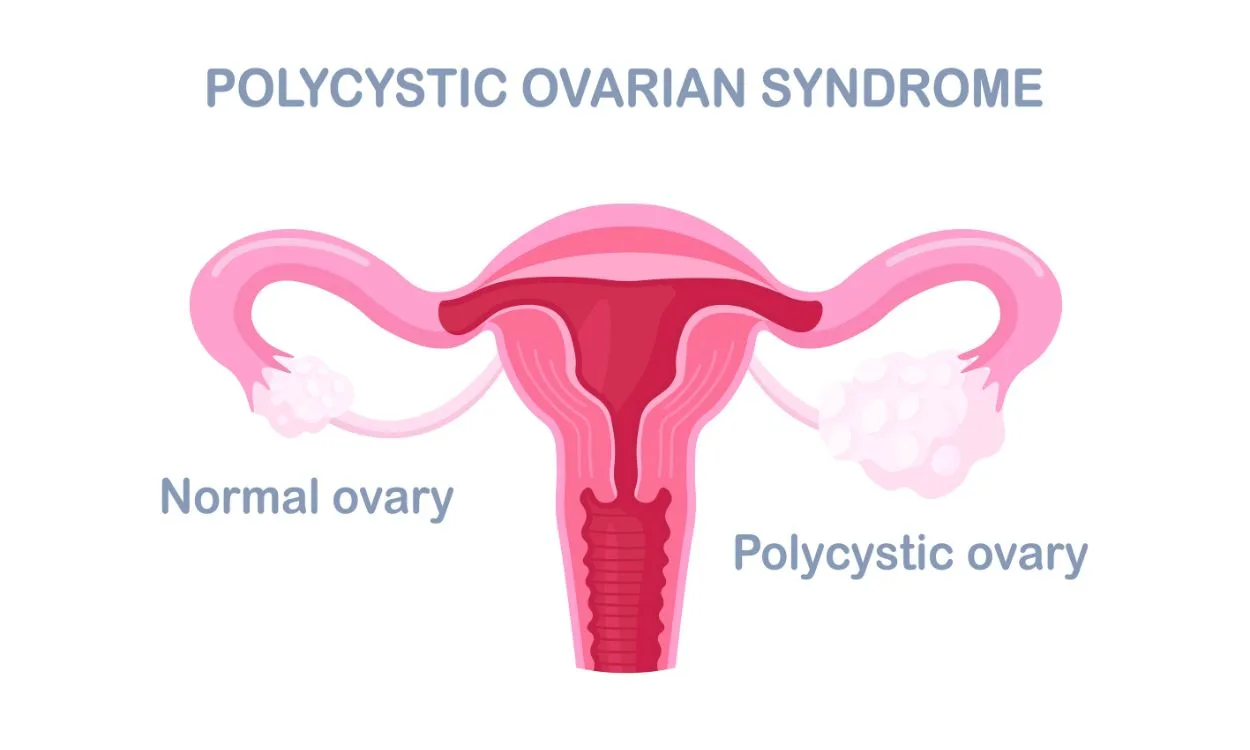What is PCOD (Polycystic Ovary Syndrome)?
Polycystic Ovary Syndrome (PCOS) is a hormonal disorder that affects women of reproductive age. It is characterized by an imbalance in the female sex hormones, which can lead to various symptoms and health complications. PCOS is a common condition, affecting around 1 in 10 women worldwide. In India, it is estimated to affect around 20-25% of women.
Understanding PCOD
PCOD is a complex condition that involves multiple factors. Here’s a detailed look at its causes, symptoms, and potential complications:
Causes
The exact cause of PCOD is not fully understood, but several factors may contribute to its development. These include:
- Hormonal Imbalance: PCOD is primarily caused by an imbalance in the levels of hormones such as estrogen, progesterone, and androgen (male hormones like testosterone) in the body. This imbalance disrupts the normal functioning of the ovaries.
- Insulin Resistance: Insulin is a hormone that helps regulate blood sugar levels. Women with PCOD often have insulin resistance, which means their body doesn’t respond properly to insulin. This can lead to elevated insulin levels, which in turn contribute to hormonal imbalances.
- Hereditary Factors: There is evidence to suggest that PCOS can run in families. If your mother or sister has PCOD, your chances of developing the condition may be higher.
Symptoms
The symptoms of PCOD can vary from person to person. Some common signs and symptoms include:
- Irregular Menstrual Cycle: Women with PCOS often have irregular periods or may experience heavy or prolonged bleeding.
- Enlarged Ovaries: The ovaries of women with PCOD may become enlarged and develop small cysts, which can be detected through an ultrasound examination.
- Hirsutism: Excessive hair growth, particularly on the face, chest, and back, is another common symptom of PCOS. This is due to the increased levels of androgen hormones.
- Acne: PCOD can also lead to the development of acne, often on the face, chest, and upper back.
- Weight Gain: Many women with PCOS struggle with weight gain or find it difficult to lose weight.
Complications
If left untreated, PCOD can lead to several health complications, including:
- Infertility: PCOD is a leading cause of infertility in women. The hormonal imbalances and irregular ovulation can make it difficult to conceive.
- Gestational Diabetes: Pregnant women with PCOS have a higher risk of developing gestational diabetes, a condition characterized by high blood sugar levels during pregnancy.
- Type 2 Diabetes: Women with PCOD are at a higher risk of developing type 2 diabetes later in life.
- Cardiovascular Problems: PCOS is associated with an increased risk of developing cardiovascular diseases such as high blood pressure, high cholesterol, and heart disease.
Managing PCOD with Fitpaa:
If you have been diagnosed with PCOD, it is important to work closely with your healthcare provider to develop a comprehensive management plan. While there is no cure for PCOD, lifestyle modifications can help alleviate symptoms and reduce the risk of complications.
Fitpaa, an AI-driven metabolism monitoring and management technology, offers personalized solutions to help individuals achieve their health and fitness goals. By optimizing metabolism and addressing lifestyle factors, Fitpaa aims to support women with PCOD in managing their condition effectively.
Here’s how Fitpaa can assist you in managing PCOD:
- Metabolism Assessment: Fitpaa’s Metabolism Monitoring Technology helps identify the root cause of your health condition by assessing your current metabolism. This information is vital for developing a personalized treatment plan.
- Fitpaa Capsule: Once your metabolism assessment is complete, Fitpaa’s team of experts, including fitness coaches, nutritionists, and doctors, will create a personalized Fitpaa Capsule based on your metabolism, health goals, lifestyle, and eating habits. This comprehensive plan incorporates medical therapy, exercise therapy, nutrition therapy, and cognitive behavior therapy.
- Daily Guidance and Support: Fitpaa’s real-time guidance technology, integrated into the Fitpaa mobile app, provides ongoing support and motivation. The app offers tools such as a virtual workout trainer, diet tracker, performance tracking, and progress tracking to help you stay on track.
- Regular Monitoring and Adjustments: Fitpaa’s team of fitness planners, nutritionists, trainers, and doctors will regularly review your progress and make any necessary adjustments to your plan to ensure optimal results.
By combining the expertise of healthcare professionals with advanced technology, Fitpaa aims to empower women with PCOD to take control of their health and achieve their fitness goals.
Download the Fitpaa App and Start Your Journey
If you are ready to take charge of your health and manage your PCOD effectively, download the Fitpaa app today. Fitpaa offers a range of features and services designed to help you achieve your health and fitness goals with guaranteed results.
With a 7-day risk-free trial, you can experience Fitpaa’s benefits without any commitment. If, for any reason, you are unable to follow the Fitpaa Capsule at the moment, you can freeze your subscription and resume it later.
Fitpaa is dedicated to helping you achieve your goals and promises to provide a full refund if you don’t achieve the promised results by the end of your subscription.
Don’t wait any longer – join the Fitpaa community and embark on your journey to better health and fitness with the support of a dedicated team and cutting-edge technology.
Remember, your wellbeing is our mission. Let Fitpaa guide you towards a healthier, happier life.









